Fleurs du Mal Magazine


Or see the index
Old Angel Midnight is a treasure trove of Kerouac’s experiments with automatic writing, a method he practiced constantly to sharpen his imaginative reflexes.
Recorded in a series of notebooks between 1956-1959, what Kerouac called his “endless automatic writing piece” began while he shared a cabin with poet Gary Snyder.
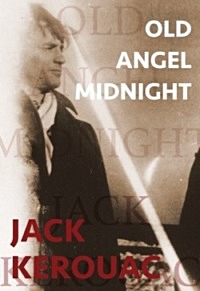 Kerouac tried to emulate Snyder’s daily Buddhist meditation discipline, using the technique of “letting go” to free his mind for pure spontaneous writing, annotating the stream of words flowing through his consciousness in response to auditory stimuli and his own mental images.
Kerouac tried to emulate Snyder’s daily Buddhist meditation discipline, using the technique of “letting go” to free his mind for pure spontaneous writing, annotating the stream of words flowing through his consciousness in response to auditory stimuli and his own mental images.
Kerouac continued his exercise in spontaneous composition over the next three years, including a period spent with William Burroughs in Tangiers. He made no revisions to the automatic writing entries in his notebooks, which were collected and transcribed for publication as originally written.
Old Angel Midnight attests to the success of Kerouac’s experiment and bears witness to his commitment to his craft, and to the pleasure he takes in writing: “I like the bliss of mind.”
“Kerouac’s ambition to capture the living moment (crucially for him, recapitulating memory) developed poetic form in 1954 with his collection San Francisco Blues, and it reached greater fulfilment with the sixty-seven free-association passages of Old Angel Midnight. This new edition from City Light Books adds one more, found among Kerouac’s papers by John Sampas, concluding ‘Eyes of Ray Charles see Me here realize O Holy.’ Mostly written during April 1956 when Kerouac shared a shack with Gary Snyder in rural Mill Valley, outside San Francisco, Old Angel Midnight was likely facilitated by the ‘letting go’ technique he observed from Snyder’s Buddhist meditation.” – Jules Smith – The Times Literary Supplement
“Tried to warn all of you, essence of stuff wont do
— God why did you make the world?
Answer: –Because I gwt pokla renamash ta va in
ming the atss are you forever with it?
I like the bliss of mind.
Awright I’ll call up all the fuckin Gods, right now!
Parya! Arrive! Ya damn hogfuckin lick lip twillerin
fishmonger! Kiss my purple royal ass baboon! Poota!
Whore! You and yr retinues of chariots & fucks! Devadatta!
Angel of Mercy! Prick! Lover! Mush! Run on
ya dog eared kiss willying nilly Dexter Michigan ass—
warlerin ratpole! The rat in my cellar’s an old canuck who
wasnt fooled by rebirth but b God gotta admit I was born for
the same reason I bring this glass to my lip — ?
Rut! Old God whore, the key to ecstasy is forevermore
furthermore blind! Potanyaka! God of Mercy!”
Excerpt from ‘Old Angel Midnight’ by Jack Kerouac
Old Angel Midnight
Jack Kerouac
Preface by Ann Charters, Michael McClure
Collection City Lights/Grey Fox
Publisher City Lights Publishers
Paperback, $13.95
Pages 94
Publication 2016
ISBN-10 087286703X
ISBN-13 9780872867031
fleursdumal.nl magazine
More in: - Book Lovers, - Book Stories, Archive K-L, Art & Literature News, Automatic writing, Kerouac, Jack, Opium-Eaters
From the best-selling author of Gratitude, On the Move, and Musicophilia, a collection of essays that displays Oliver Sacks’s passionate engagement with the most compelling and seminal ideas of human endeavor: evolution, creativity, memory, time, consciousness, and experience.
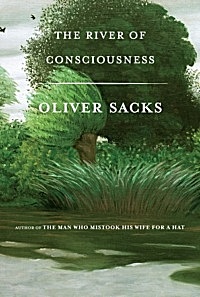 Oliver Sacks, a scientist and a storyteller, is beloved by readers for the extraordinary neurological case histories (Awakenings, An Anthropologist on Mars) in which he introduced and explored many now familiar disorders–autism, Tourette’s syndrome, face blindness, savant syndrome.
Oliver Sacks, a scientist and a storyteller, is beloved by readers for the extraordinary neurological case histories (Awakenings, An Anthropologist on Mars) in which he introduced and explored many now familiar disorders–autism, Tourette’s syndrome, face blindness, savant syndrome.
He was also a memoirist who wrote with honesty and humor about the remarkable and strange encounters and experiences that shaped him (Uncle Tungsten, On the Move, Gratitude).
Sacks, an Oxford-educated polymath, had a deep familiarity not only with literature and medicine but with botany, animal anatomy, chemistry, the history of science, philosophy, and psychology.
The River of Consciousness is one of two books Sacks was working on up to his death, and it reveals his ability to make unexpected connections, his sheer joy in knowledge, and his unceasing, timeless project to understand what makes us human.
Oliver Sacks was born in 1933 in London and was educated at Queen’s College, Oxford. He completed his medical training at San Francisco’s Mount Zion Hospital and at UCLA before moving to New York.
Familiar to the readers of The New Yorker and The New York Review of Books, Dr. Sacks spent more than fifty years working as a neurologist and wrote many books, including The Man Who Mistook His Wife for a Hat, Musicophilia, and Hallucinations, about the strange neurological predicaments and conditions of his patients.
The New York Times referred to him as “the poet laureate of medicine,” and over the years he received many awards, including honors from the Guggenheim Foundation, the National Science Foundation, the American Academy of Arts and Letters, The American Academy of Arts and Sciences, and the Royal College of Physicians. His memoir On the Move was published shortly before his death in August 2015.
The River of Consciousness
By Oliver Sacks
Hardcover
Oct 24, 2017
256 Pages
$27.00
Published by Knopf
5-1/2 x 8-3/8
ISBN 9780385352567
new books
fleursdumal.nl magazine
More in: - Book News, - Book Stories, Archive S-T, Art & Literature News, AUDIO, CINEMA, RADIO & TV, DRUGS & MEDICINE & LITERATURE, Natural history, Oliver Sacks, Psychiatric hospitals

Written in Northampton County Asylum
I am! yet what I am who cares, or knows?
My friends forsake me like a memory lost.
I am the self-consumer of my woes;
They rise and vanish, an oblivious host,
Shadows of life, whose very soul is lost.
And yet I am–I live–though I am toss’d
Into the nothingness of scorn and noise,
Into the living sea of waking dream,
Where there is neither sense of life, nor joys,
But the huge shipwreck of my own esteem
And all that ‘s dear. Even those I loved the best
Are strange–nay, they are stranger than the rest.
I long for scenes where man has never trod–
For scenes where woman never smiled or wept–
There to abide with my Creator, God,
And sleep as I in childhood sweetly slept,
Full of high thoughts, unborn. So let me lie,–
The grass below; above, the vaulted sky.
John Clare
(1793-1864)
Written in Northampton County Asylum
fleursdumal.nl magazine
More in: Archive C-D, Archive C-D, Clare, John, Psychiatric hospitals
When Oliver Sacks was twelve years old, a perceptive schoolmaster wrote in his report: “Sacks will go far, if he does not go too far.”
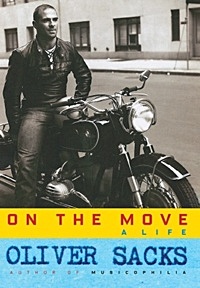 It is now abundantly clear that Sacks has never stopped going. From its opening pages on his youthful obsession with motorcycles and speed, On the Move is infused with his restless energy.
It is now abundantly clear that Sacks has never stopped going. From its opening pages on his youthful obsession with motorcycles and speed, On the Move is infused with his restless energy.
As he recounts his experiences as a young neurologist in the early 1960s, first in California, where he struggled with drug addiction, and then in New York, where he discovered a long-forgotten illness in the back wards of a chronic hospital, we see how his engagement with patients comes to define his life.
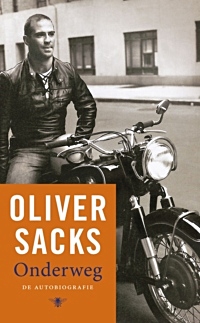 With unbridled honesty and humor, Sacks shows us that the same energy that drives his physical passions—weight lifting and swimming—also drives his cerebral passions.
With unbridled honesty and humor, Sacks shows us that the same energy that drives his physical passions—weight lifting and swimming—also drives his cerebral passions.
He writes about his love affairs, both romantic and intellectual; his guilt over leaving his family to come to America; his bond with his schizophrenic brother; and the writers and scientists—Thom Gunn, A. R. Luria, W. H. Auden, Gerald M. Edelman, Francis Crick—who influenced him.
On the Move is the story of a brilliantly unconventional physician and writer—and of the man who has illuminated the many ways that the brain makes us human.
English:
On The Move:
A Life
Author: Oliver Sacks
Publisher: Alfred A. Knopf
Published: 2015
ISBN-10: 0385352549
ISBN-13: 9780385352543
Format: Hardcover
In Dutch:
Oliver Sacks:
Onderweg
Nederlands
Uitg. De Bezige Bij
Vertaald door
Otto Biersma & Luud Dorresteijn
432 pagina’s
Verschijningsjaar 2016
ISBN10 9023499484
ISBN13 9789023499480
fleursdumal.nl magazine
More in: - Book News, - Bookstores, Archive S-T, DRUGS & MEDICINE & LITERATURE, Oliver Sacks
Deutschland 1940: Max Koenig ist Professor für Altertumsforschung. Ein vererbtes Nervenleiden reißt ihn aus seinem beruflichen Leben und fort von seiner Familie.
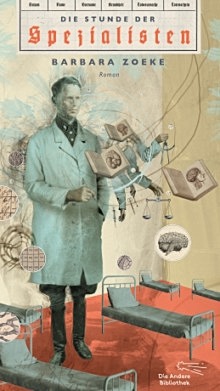 Er kommt in die Wittenauer Heilstätten und trifft dort auf Schwester Rosemarie, die versucht zu helfen, wo sie kann. Trotz seiner Hinfälligkeit wird Koenig zum Mittelpunkt einer kleinen Gruppe: dem Studienrat Dr. Carl Hohein, der eine Litanei auf die Farbe »Schwarz« komponiert, der jungen Pianistin Elfie, deren Hände zittern und die »Traumdeutsch« spricht, und schließlich Oscar, einem Jungen mit Trisomie 21.
Er kommt in die Wittenauer Heilstätten und trifft dort auf Schwester Rosemarie, die versucht zu helfen, wo sie kann. Trotz seiner Hinfälligkeit wird Koenig zum Mittelpunkt einer kleinen Gruppe: dem Studienrat Dr. Carl Hohein, der eine Litanei auf die Farbe »Schwarz« komponiert, der jungen Pianistin Elfie, deren Hände zittern und die »Traumdeutsch« spricht, und schließlich Oscar, einem Jungen mit Trisomie 21.
Der Alltag auf der Station, die mangelhaften Essensrationen und die rassenhygienischen Kommentare der medizinischen »Spezialisten« werden nur durch die gegenseitige Unterstützung und kleine Freuden, wie die Besuche von Frau und Schwägerin, erträglich. Sie hoffen darauf, sich nach dem Krieg im Traumland Italien wiederzufinden. Doch Max Koenig und Oscar werden verlegt und ihren Angehörigen entzogen.
Töten wird sie Dr. Friedel Lerbe, ein Arzt, SS-Mann und fanatischer Verfechter der Rassenhygiene. Als Leiter einer Tötungsanstalt führt er das NS-»Euthanasie«-Programm mit bürokratischer Präzision aus – jedes Detail des Ablaufs wird von ihm kontrolliert. Ein ganzer Stab von »Pflegern«, Sekretärinnen, Technikern und Leichenbrennern steht diesem »Spezialisten« bei seinem Handwerk zur Seite.
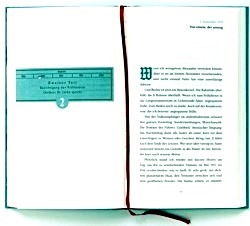 Barbara Zoeke schildert das Geschehen aus unterschiedlichen Perspektiven – empathisch und erschütternd klar. Es gelingt ihr, dieses Verbrechen der Nationalsozialisten zu vergegenwärtigen und den Opfern, Angehörigen und Tätern eine literarische Stimme zu geben.
Barbara Zoeke schildert das Geschehen aus unterschiedlichen Perspektiven – empathisch und erschütternd klar. Es gelingt ihr, dieses Verbrechen der Nationalsozialisten zu vergegenwärtigen und den Opfern, Angehörigen und Tätern eine literarische Stimme zu geben.
Barbara Zoeke erhält für ihren Roman „Die Stunde der Spezialisten“ den Brüder-Grimm-Preis 2017 der Stadt Hanau!
Die Preisverleihung findet am 17. November in der Hanauer Stadtbibliothek/Kulturforum Hanau statt. Die Laudatio auf die Preisträgerin wird der Literatur-Chef der Frankfurter Allgemeinen Zeitung Andreas Platthaus halten. Die Auszeichnung ist mit 10.000 Euro dotiert.
Die Jury mit Literaturkritikerin Dr. Insa Wilke, Literaturprofessor Professor Dr. Heiner Boehncke und dem ehemaligen Vorsitzenden des hessischen Bibliotheksverbandes Aloys Lenz MdL a.D. votierte nach eingehender Diskussion der eingereichten Veröffentlichungen einstimmig für das kürzlich im Verlag „Die Andere Bibliothek“ erschienene Buch. Der Magistrat der Stadt Hanau schloss sich einmütig dem Votum der Jury an.
Aus der Jury-Entscheidung:
„Barbara Zoekes Roman „Die Stunde der Spezialisten“ widmet sich einem in der deutschsprachigen Literatur immer noch auffällig selten erzählten Verbrechen der Nationalsozialisten: der Ermordung von Psychiatriepatienten und Behinderten, allgemein unter dem Euphemismus 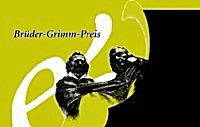 „Euthanasie“ bekannt. Autorinnen wie Olga Martynova und entfernt auch Angela Steidele haben sich zuletzt mit diesem Stoff auseinandergesetzt; Barbara Zoeke ist jedoch die erste Autorin, die wohl auch aufgrund ihrer psychiatrischen Praxis die besondere Sprache der Patienten in eine literarische verwandelt und ihnen so auf besondere Weise ein Denkmal setzt. Virtuos komponiert sie auf diese Weise aus den Stimmen der Opfer wie auch der Täter in je spezifischen Sprechweisen ein beklemmendes Kunstwerk in humanistischen Traditionen, das bei seinen Leserinnen und Lesern für einen inneren Aufruhr sorgt, wie ihn nur hervorragende literarische Werke hervorzubringen imstande sind. Die Jury sieht in der meisterlichen Sprache des Romans und dem sensiblen Umgang mit den unterschiedlichen Stimmen überdies eine Nähe zu dem Werk der Brüder Grimm, das sich auf der Grenze zwischen Archiv, Sprachforschung und Erzählen bewegt.“
„Euthanasie“ bekannt. Autorinnen wie Olga Martynova und entfernt auch Angela Steidele haben sich zuletzt mit diesem Stoff auseinandergesetzt; Barbara Zoeke ist jedoch die erste Autorin, die wohl auch aufgrund ihrer psychiatrischen Praxis die besondere Sprache der Patienten in eine literarische verwandelt und ihnen so auf besondere Weise ein Denkmal setzt. Virtuos komponiert sie auf diese Weise aus den Stimmen der Opfer wie auch der Täter in je spezifischen Sprechweisen ein beklemmendes Kunstwerk in humanistischen Traditionen, das bei seinen Leserinnen und Lesern für einen inneren Aufruhr sorgt, wie ihn nur hervorragende literarische Werke hervorzubringen imstande sind. Die Jury sieht in der meisterlichen Sprache des Romans und dem sensiblen Umgang mit den unterschiedlichen Stimmen überdies eine Nähe zu dem Werk der Brüder Grimm, das sich auf der Grenze zwischen Archiv, Sprachforschung und Erzählen bewegt.“
Dr. Barbara Zoeke verbrachte ihre Kindheit im thüringischen Vogtland und studierte in Köln und Münster. Sie ist habilitierte Psychologin, forschte in den USA und war über mehrere Jahre im Vorstand der “International Society of Comparative Psychology”. Sie lehrte und forschte an den Universitäten von Münster, Frankfurt, Würzburg und München. Neben wissenschaftlichen Arbeiten zur Wahrnehmung und zum Gedächtnis veröffentlichte sie erzählende Prosa, Lyrik und Sachbuchtexte. Die Autorin lebt seit 2008 in Berlin.
Barbara Zoeke
Die Stunde der Spezialisten
Seitenanzahl: 300
Originalausgaben
Bandnummer: 393
Originalausgabe,
nummeriert und limitiert
Gestaltung: Lars Henkel.
Kunstvolle Collagen für Cover,
Bezug, Vor- und Nachsatzpapier.
Fadenheftung, Lesebändchen.
ISBN: 9783847703938
2017 – 42,00 EUR
Die Andere Bibliothek
10969 Berlin
# website die andere bibliothek
fleursdumal.nl magazine
More in: - Book News, - Bookstores, Archive Y-Z, Art & Literature News, DRUGS & MEDICINE & LITERATURE, Grimm, Andersen e.o.: Fables, Fairy Tales & Stories, WAR & PEACE
1940 ist Max Koenig Professor für Kunstgeschichte. Ein vererbtes Nervenleiden reißt ihn aus seinem beruflichen Leben und fort von seiner italienischen Frau und der kleinen Tochter. Er kommt in eine Heilanstalt nach Berlin Wittenau.
 Trotz seiner Hinfälligkeit wird er zum Mittelpunkt einer kleinen Gruppe: einem Schizophrenen, der eine Litanei auf die Farbe »Schwarz« komponiert, einer jungen Pianistin, einer zierlichen Alzheimer frau und schließlich Oscar, einem Jungen mit Trisomie 21. Der Alltag auf der Station und die rassenhygienischen Kommentare der medizinischen »Spezialisten« werden nur durch kleine Freuden, wie die gelegentlichen Besuche von Frau und Schwägerin, erträglich. Als die Patienten erfasst und klassifiziert werden, schließt sich die kleine Gruppe noch enger zusammen.
Trotz seiner Hinfälligkeit wird er zum Mittelpunkt einer kleinen Gruppe: einem Schizophrenen, der eine Litanei auf die Farbe »Schwarz« komponiert, einer jungen Pianistin, einer zierlichen Alzheimer frau und schließlich Oscar, einem Jungen mit Trisomie 21. Der Alltag auf der Station und die rassenhygienischen Kommentare der medizinischen »Spezialisten« werden nur durch kleine Freuden, wie die gelegentlichen Besuche von Frau und Schwägerin, erträglich. Als die Patienten erfasst und klassifiziert werden, schließt sich die kleine Gruppe noch enger zusammen.
Alle hoffen darauf, sich nach dem Krieg im Traumland Italien wiederzufinden. Doch Max Koenig und Oscar werden verlegt und ihren Angehörigen entzogen. Töten wird sie Dr. Friedel Lerbe, Mediziner und SSMann. Als Leiter einer Tötungsanstalt führt er das NS »Euthanasie« Programm mit bürokratischer Präzision aus – jedes Detail des Ablaufs wird von ihm kontrolliert.
Ein ganzer Stab von »Pflegern«, Sekretärinnen, Technikern und Leichen brennern steht diesem »Spezialisten« bei seinem Handwerk zur Seite.
Barbara Zoeke wuchs im thüringischen Vogtland auf und studierte in Köln und Münster Psychologie. Sie ist habilitierte Psychologin und Schriftstellerin.
Barbara Zoeke lebt seit 2008 in Berlin.
Barbara Zoeke
Die Stunde der Spezialisten
Roman
Ca. 300 Seiten
Originalausgabe, nummeriert und limitiert
Gestaltung: Lars Henkel.
Kunstvolle Collage für Cover, Bezug, Vor- und Nachsatzpapier.
Fadenheftung, Lesebändchen.
September 2017
Band 393
€ 42
ISBN 9783847703938
DIE ANDERE BIBLIOTHEK 2017/18
Empathisch und erschütternd klar: In Barbara Zoekes Roman kommen Opfer und Täter eines der verdrängten Verbrechen der Nationalsozialisten zu Wort
fleursdumal.nl magazine
More in: - Book Lovers, - Book News, Archive Y-Z, Art & Literature News, Psychiatric hospitals
Selected for the National Poetry Series by Ada Limón, I Know Your Kind is a haunting, blistering debut collection about the American opioid epidemic and poverty in rural Appalachia.
 In West Virginia, fatal overdoses on opioids have spiked to three times the national average. In these poems, William Brewer demonstrates an immersive, devastating empathy for both the lost and the bereaved, the enabled and the enabler, the addict who knocks late at night and the brother who closes the door.
In West Virginia, fatal overdoses on opioids have spiked to three times the national average. In these poems, William Brewer demonstrates an immersive, devastating empathy for both the lost and the bereaved, the enabled and the enabler, the addict who knocks late at night and the brother who closes the door.
He shows us the high, at once numbing and transcendent: “this warm moment when I forget which part of me / I blamed.”
He shows us the overdose, when “the poppies on my arms / bruised red petals.” And he shows us the mourner, attending his high school reunion: “I guess we were underdressed: / me in my surf shoes / you in an urn.”
Underneath and among this multiplicity of voices runs the Appalachian landscape—a location, like the experience of drug addiction itself, of stark contrasts: beauty and ruin, nature and industry, love and despair.
Uncanny, heartbreaking, and often surreal, I Know Your Kind is an unforgettable elegy for the people and places that have been lost to opioids.
William Brewer is the author of I Know Your Kind, a winner of the 2016 National Poetry Series, as well as the chapbook Oxyana, which was awarded the Poetry Society of America Chapbook Fellowship 30 and Under. He is currently a Stegner Fellow at Stanford University. He was born and raised in West Virginia.
Poetry
I Know Your Kind
By William Brewer
Paperback $16.00
ISBN: 978-1-57131-495-6
Publish Date: Sept. 2017
Pages: 96
Size:5.5 × 8.5 × 0.25 in
Milkweed Books
fleursdumal.nl magazine
More in: - Book News, - Bookstores, Archive A-B, Art & Literature News, EDITOR'S CHOICE, Opium-Eaters

Samuel Taylor Coleridge
Love
All thoughts, all passions, all delights,
Whatever stirs this mortal frame,
All are but ministers of Love,
And feed his sacred flame.
Oft in my waking dreams do I
Live o’er again that happy hour,
When midway on the mount I lay,
Beside the ruined tower.
The moonshine, stealing o’er the scene
Had blended with the lights of eve:
And she was there, my hope, my joy,
My own dear Genevieve!.
She leant against the arméd man,
The statue of the arméd knight:
She stood and listened to my lay,
Amid the lingering light.
Few sorrows hath she of her own,
My hope ! my joy ! my Genevieve !
She loves me best, whene’er I sing
The songs that make her grieve.
I played a soft and doleful air,
I sang an old and moving story-
An old rude song, that suited well
That ruin wild and hoary.
She listened with a flitting blush,
With downcast eyes and modest grace:
For well she know, I could not choose
But gaze upon her face.
I told her of the Knight that wore
Upon his shield a burning brand:
And that for ten long years he wooed
The Lady of the Land.
I told her how he pined : and ah!
The deep, the low, the pleading tone
With which I sang another’s love,
Interpreted my own.
She listened with a flitting blush,
With downcast eyes, and modest grace:
And she forgave me, that I gazed
Too fondly on her face!.
But when I told the cruel scorn
That crazed that bold and lovely Knight,
And that he crossed the mountain-woods,
Nor rested day nor night:
That sometimes from the savage den,
And sometimes from the darksome shade,
And sometimes starting up at once
In green and sunny glade,-
There came and looked him in the face
An angel beautiful and bright:
And that he knew it was a Fiend,
This miserable Knight!.
And that unknowing what he did,
He leaped amid a murderous band,
And saved from outrage worse than death
The Lady of the Land!.
And how she wept, and clasped his knees:
And how she tended him in vain-
And ever strove to expiate
The scorn that crazed his brain ;-
And that she nursed him in a cave:
And how his madness went away,
When on the yellow forest-leaves
A dying man he lay ;-
His dying words -but when I reached
That tenderest strain of all the ditty,
My faultering voice and pausing harp
Disturbed her soul with pity!.
All impulses of soul and sense
Had thrilled my guileless Genevieve:
The music and the doleful tale,
The rich and balmy eve:
And hopes, and fears that kindle hope,
An undistinguishable throng,
And gentle wishes long subdued,
Subdued and cherished long!.
She wept with pity and delight,
She blushed with love, and virgin-shame:
And like the murmur of a dream,
I heard her breathe my name.
Her bosom heaved -she stepped aside,
As conscious of my look she stepped-
The suddenly, with timorous eye
She fled to me and wept.
She half enclosed me with her arms,
She pressed me with a meek embrace:
And bending back her head, looked up,
And gazed upon my face.
‘Twas partly love, and partly fear,
And partly ’twas a bashful art,
That I might rather feel, than see,
The swelling of her heart.
I calmed her fears, and she was calm,
And told her love with virgin pride:
And so I won my Genevieve,
My bright and beauteous Bride.
Samuel Taylor Coleridge (1772 – 1834)
Love
fleursdumal.nl magazine
More in: Archive C-D, Coleridge, Coleridge, Samuel Taylor
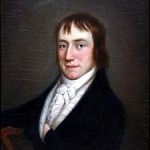
William Wordsworth
I wandered lonely as a cloud
I wandered lonely as a cloud
That floats on high o’er vales and hills,
When all at once I saw a crowd,
A host, of golden daffodils;
Beside the lake, beneath the trees,
Fluttering and dancing in the breeze.
Continuous as the stars that shine
And twinkle on the milky way,
They stretched in never-ending line
Along the margin of a bay:
Ten thousand saw I at a glance,
Tossing their heads in sprightly dance.
The waves beside them danced, but they
Out-did the sparkling leaves in glee;
A poet could not be but gay,
In such a jocund company!
I gazed—and gazed—but little thought
What wealth the show to me had brought:
For oft, when on my couch I lie
In vacant or in pensive mood,
They flash upon that inward eye
Which is the bliss of solitude;
And then my heart with pleasure fills,
And dances with the daffodils.
William Wordsworth (1770 – 1850)
I wandered lonely as a cloud
fleursdumal.nl magazine
More in: Archive W-X, Wordsworth, Wordsworth, William

Samuel Taylor Coleridge
Youth And Age a poem
Verse, a breeze ‘mid blossoms straying,
Where Hope clung feeding, like a bee
Both were mine! Life went a-maying
With Nature, Hope, and Poesy,
When I was young!
When I was young? Ah, woeful When!
Ah! for the change ‘twixt Now and Then!
This breathing house not built with hands,
This body that does me grievous wrong,
O’er aery cliffs and glittering sands
How lightly then it flashed along,
Like those trim skiffs, unknown of yore,
On winding lakes and rivers wide,
That ask no aid of sail or oar,
That fear no spite of wind or tide!
Nought cared this body for wind or weather
When Youth and I lived in’t together.
Flowers are lovely; Love is flower-like;
Friendship is a sheltering tree;
O the joys! that came down shower-like,
Of Friendship, Love, and Liberty,
Ere I was old!
Ere I was old? Ah woeful Ere,
Which tells me, Youth’s no longer here!
O Youth! for years so many and sweet
‘Tis known that Thou and I were one,
I’ll think it but a fond conceit
It cannot be that Thou art gone!
Thy vesper-bell hath not yet tolled
And thou wert aye a masker bold!
What strange disguise hast now put on,
To make believe that thou art gone?
I see these locks in silvery slips,
This drooping gait, this altered size:
But Springtide blossoms on thy lips,
And tears take sunshine from thine eyes:
Life is but Thought: so think I will
That Youth and I are housemates still.
Dew-drops are the gems of morning,
But the tears of mournful eve!
Where no hope is, life’s a warning
That only serves to make us grieve
When we are old:
That only serves to make us grieve
With oft and tedious taking-leave,
Like some poor nigh-related guest
That may not rudely be dismist;
Yet hath out-stayed his welcome while,
And tells the jest without the smile.
Samuel Taylor Coleridge (1772 – 1834)
Poem: Youth And Age
fleursdumal.nl magazine
More in: Archive C-D, Coleridge, Coleridge, Samuel Taylor

William Wordsworth
London 1802
Milton! thou should’st be living at this hour:
England hath need of thee: she is a fen
Of stagnant waters: altar, sword, and pen,
Fireside, the heroic wealth of hall and bower,
Have forfeited their ancient English dower
Of inward happiness. We are selfish men;
Oh! raise us up, return to us again;
And give us manners, virtue, freedom, power.
Thy soul was like a Star, and dwelt apart:
Thou hadst a voice whose sound was like the sea:
Pure as the naked heavens, majestic, free,
So didst thou travel on life’s common way,
In cheerful godliness; and yet thy heart
The lowliest duties on herself did lay.
William Wordsworth (1770 – 1850)
Poem: London 1802
fleursdumal.nl magazine
More in: Archive W-X, Milton, John, Wordsworth, Wordsworth, William

Samuel Taylor Coleridge
Xanadu – Kubla Khan
In Xanadu did Kubla Khan
A stately pleasure-dome decree:
Where Alph, the sacred river, ran
Through caverns measureless to man
Down to a sunless sea.
So twice five miles of fertile ground
With walls and towers were girdled round:
And there were gardens bright with sinuous rills,
Where blossomed many an incense-bearing tree;
And here were forests ancient as the hills,
Enfolding sunny spots of greenery.
But oh! that deep romantic chasm which slanted
Down the green hill athwart a cedarn cover!
A savage place! as holy and enchanted
As e’er beneath a waning moon was haunted
By woman wailing for her demon-lover!
And from this chasm, with ceaseless turmoil seething,
As if this earth in fast thick pants were breathing,
A mighty fountain momently was forced:
Amid whose swift half-intermitted burst
Huge fragments vaulted like rebounding hail,
Or chaffy grain beneath the thresher’s flail:
And ‘mid these dancing rocks at once and ever
It flung up momently the sacred river.
Five miles meandering with a mazy motion
Through wood and dale the sacred river ran,
Then reached the caverns measureless to man,
And sank in tumult to a lifeless ocean:
And ‘mid this tumult Kubla heard from far
Ancestral voices prophesying war!
The shadow of the dome of pleasure
Floated midway on the waves;
Where was heard the mingled measure
From the fountain and the caves.
It was a miracle of rare device,
A sunny pleasure-dome with caves of ice!
A damsel with a dulcimer
In a vision once I saw:
It was an Abyssinian maid,
And on her dulcimer she played,
Singing of Mount Abora.
Could I revive within me
Her symphony and song,
To such a deep delight ‘twould win me
That with music loud and long
I would build that dome in air,
That sunny dome! those caves of ice!
And all who heard should see them there,
And all should cry, Beware! Beware!
His flashing eyes, his floating hair!
Weave a circle round him thrice,
And close your eyes with holy dread,
For he on honey-dew hath fed
And drunk the milk of Paradise.
Samuel Taylor Coleridge (1772 – 1834)
Xanadu – Kubla Khan
fleursdumal.nl magazine
More in: Archive C-D, Coleridge, Coleridge, Samuel Taylor
Thank you for reading Fleurs du Mal - magazine for art & literature